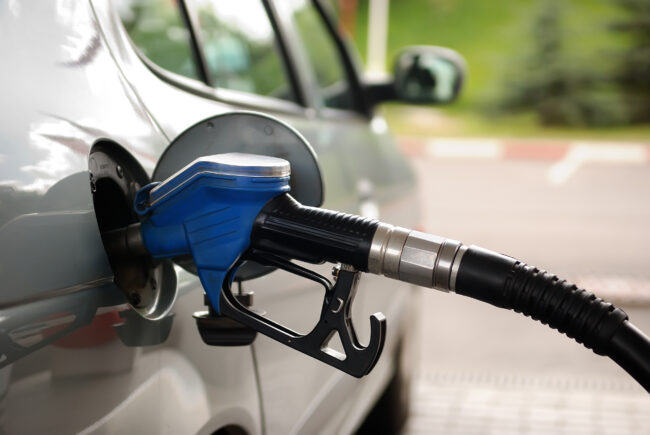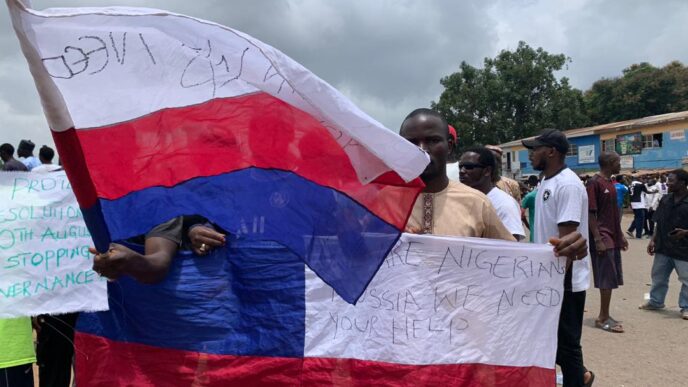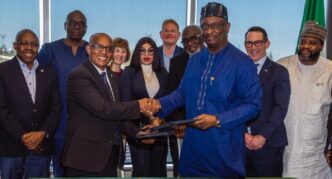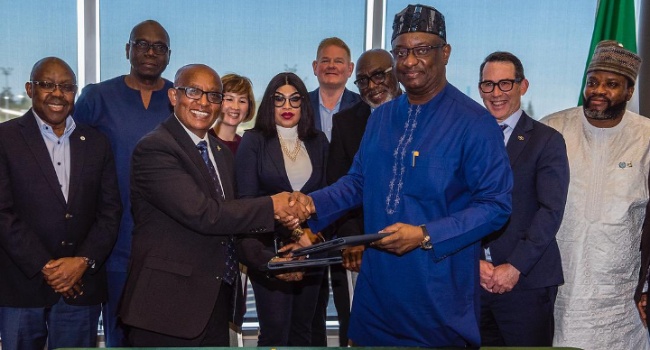Heineken Lokpobiri, minister of state for petroleum resources, (oil), says the petrol smuggling to neighbouring cannot stop in Nigeria.
Lokpobiri spoke recently at the just concluded 2024 energy and labour summit organised by the Petroleum and Natural Gas Senior Staff Association of Nigeria (PENGASSAN) in Abuja.
He said petrol smuggling from Nigeria to neighbouring West African countries is increasing because the Nigerian National Petroleum Company (NNPC) Limited sells the product below the landing cost.
“Nigeria plays a very critical role in the energy security in Africa. That is why whatever PMS we import into Nigeria finds its way to the whole of West Africa. That is why smuggling cannot stop”, Lokpobiri said.
Advertisement
“If NNPC imports PMS and sells to marketers at perhaps N600 or below, there’s no way that smuggling can stop because security agents at the borders are also involved.
“When smugglers are taking the products outside the country, even if you put all the policemen on the road, they are Nigerians; you and I know the answer.
“If you put all the customs men on the road, they are Nigerians, you and I know what the problem is, and that is why I’m saying that for Africa to attain energy security, Nigeria has to play a very strategic role.”
Advertisement
‘NNPC DOESN’T HAVE FUNDS REQUIRED TO FIX OLD PIPELINES’
To do this, the minister said Nigeria needs to ramp up production, but noted that the pipelines need to be fixed because “they are old, corroded, and expired”.
“Part of our problem is that pipelines that were traditionally transporting our crude were built in the 1960s and the 1970s and the lifespan is since over,” Lokpobiri said.
“We have identified that even when we can produce, evacuation is a big problem.
Advertisement
“The reason why pipeline vandalism is very easy to do is because the pipelines have all expired [and] completely corroded and so, anybody can just go and tap it and the thing is burst.
“But there are better technologies which are more expensive, there are better pipelines that other people are using in other countries, but they are not cheap. We also need to change our model.
“Now, the NNPC that is our joint venture partner, do they have the money to be able to replace these pipelines?
“I think NNPC will speak for themselves whether they have the money to be able to do that, and I don’t think they have.”
Advertisement
Lokpobiri called for public-private partnerships to fix the old pipelines and improve the sector.
“That is why we have to go for the global model – PPP. We have to get the private sector to come in,” he said.
Advertisement
“For the private sector to come into any country to invest, they must have confidence in such a country. This was lacking in the past 12 years when there was no foreign investment in the nation’s oil company.
“When this government came, we tried to rebuild the confidence, and investors are coming.”
Advertisement
Lokpobiri also assured that no international oil company (IOC) is leaving the country.
‘CRUDE SUPPLY TO LOCAL REFINERIES MAY SUFFER SETBACK’
Advertisement
Speaking on the supply of crude to Dangote and other local refineries, he said unless production is ramped up, this move may suffer a setback.
“Our ambition is to ramp up production. It is only when we ramp on production that the midstream and the downstream can also be successful,” the minister said.
“You know we resolve at the federal executive council to sell crude to local refineries – Dangote and the other refineries that are refining products for local consumption.
“But the bigger challenge is whether we have enough quantity to be able to supply them because of certain things that happened before we came.
“You will agree with me that when I became minister one year ago, we were doing barely about a million barrels, but today we’re doing approximately 1.7mbpd, inclusive of condensate.
“Supporting local refining is the way to go. We can look for investors to explore and ring out this crude.”
This, he said, is so that Nigeria will be able to meet both its domestic obligation and also export some to raise more dollars.
Lokpobiri said the federal government is committed to ensuring support for local refineries with all the feedstock.
He also said the federal government would ensure there is healthy competition by being fair to both the small and the big refiners.
However, the minister said if local refineries must be supplied and “you don’t have the crude to supply, it remains something that is written beautifully in a law”.
Add a comment












